Abby-Net Summer Schools
The Abby-Net summer schools take place since 2012 with alternating between locations in Alberta and Bavaria. Abby-Net summer schools center around the interdisciplinary approach on energy transitions by bringing together students from various scientific discipline and letting them work in mixed teams to develop concepts and approaches to sustainable energy transitions.
11th Abby-Net Summer School at Saldenburg, Germany
from August 8 to 15, 2025.
Energy Systems and Natural Resource Management under Climate Change.

The purpose of the 11th ABBY-Net Summer School is to train young scientists in interdisciplinary approaches to energy and ecosystem research. The program will focus on the interaction between climate change and resource-management issues in the province of Alberta, and the impact of resource extraction on natural ecosystem functioning. Students will attend seminars on key extra-disciplinary topics (energy systems, environmental systems, energy economics, and data analysis), and participate in field excursions designed to educate participants on local resource-management issues. Participants will be challenged to develop inter-disciplinary research proposals designed to solve practical problems related to energy development in Alberta and facilitate future research directions in ABBY-Net.
for more infos download the Official Flyer.
Fees: To cover parts of the cost for food and lodging, a participation fee is charged of €400 is charged.
Please apply online at Application Summer School 2026.
Deadline for all applications is February 15th 2026.
10th Abby-Net Summer School at the Barier Lake Station (Alberta)
between 2nd and 9th of August 2025.
Energy Systems and Natural Resource Management under Climate Change.
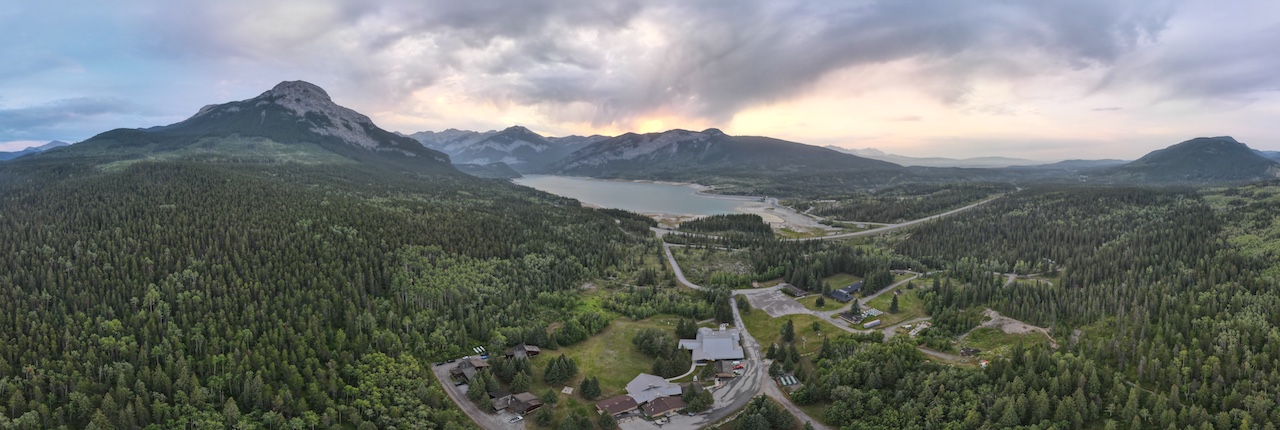
The purpose of the 10th ABBY-Net Summer School is to train young scientists in interdisciplinary approaches to energy and ecosystem research. The program will focus on the interaction between climate change and resource-management issues in the province of Alberta, and the impact of resource extraction on natural ecosystem functioning. Students will attend seminars on key extra-disciplinary topics (energy systems, environmental systems, energy economics, and data analysis), and participate in field excursions designed to educate participants on local resource-management issues. Participants will be challenged to develop inter-disciplinary research proposals designed to solve practical problems related to energy development in Alberta and facilitate future research directions in ABBY-Net.
for more infos download the Official Flyer.
9th Abby-Net Summer School at the TUM Research Center, Friedrich N. Schwarz, Berchtesgaden, Germany between 10th and 17th of August 2024.
Energy Systems and Natural Resource Management under Climate Change.
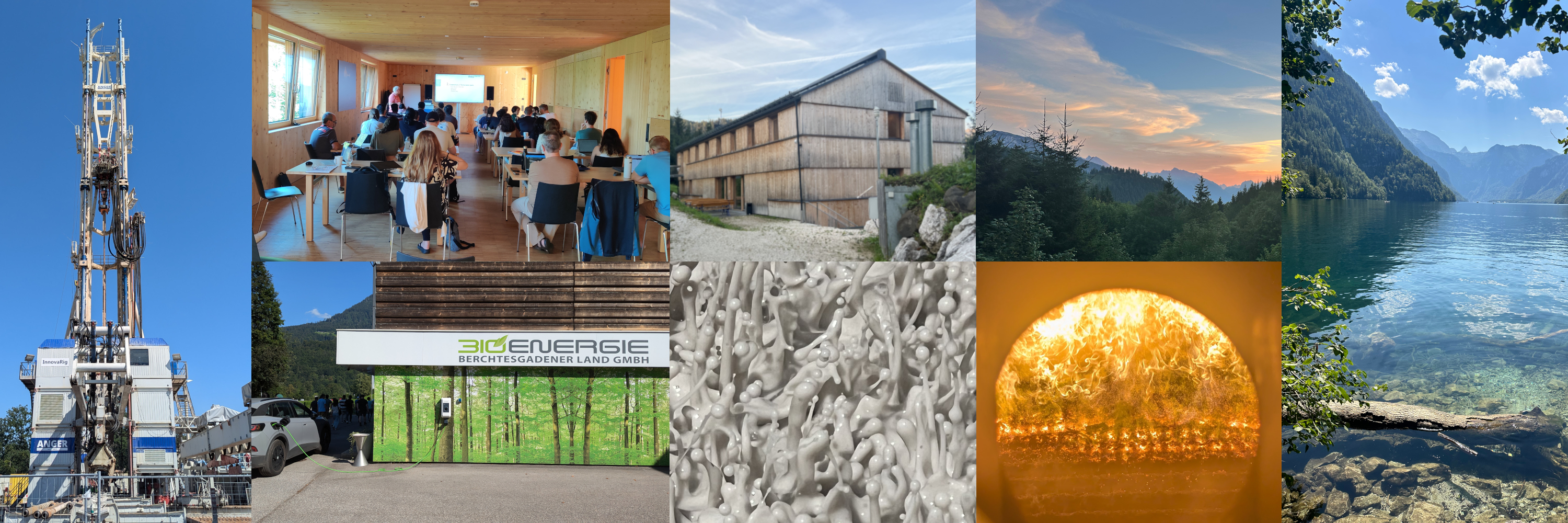
The 2024 ABBY-Net Summer School trained young scientists in interdisciplinary approaches to energy and ecosystem research. The courses focused on resource-management issues in a comparative context of German and Canadian settings, and the impact of conventional and renewable energy systems on natural ecosystem functioning. Students attended seminars on key extra-disciplinary topics (energy systems, environmental systems, energy economics, and data analysis), and participated in field excursions designed to educate participants on local resource-management issues. Finally, the participants developed inter-disciplinary research proposals designed to solve practical problems related to energy development in Bavaria and Alberta.
for more infos download the Official Flyer.
8th Abby-Net Summer School at the Barier Lake Station (Alberta) between 5th and 12th of August 2023.
Energy Systems and Natural Resource Management under Climate Change.
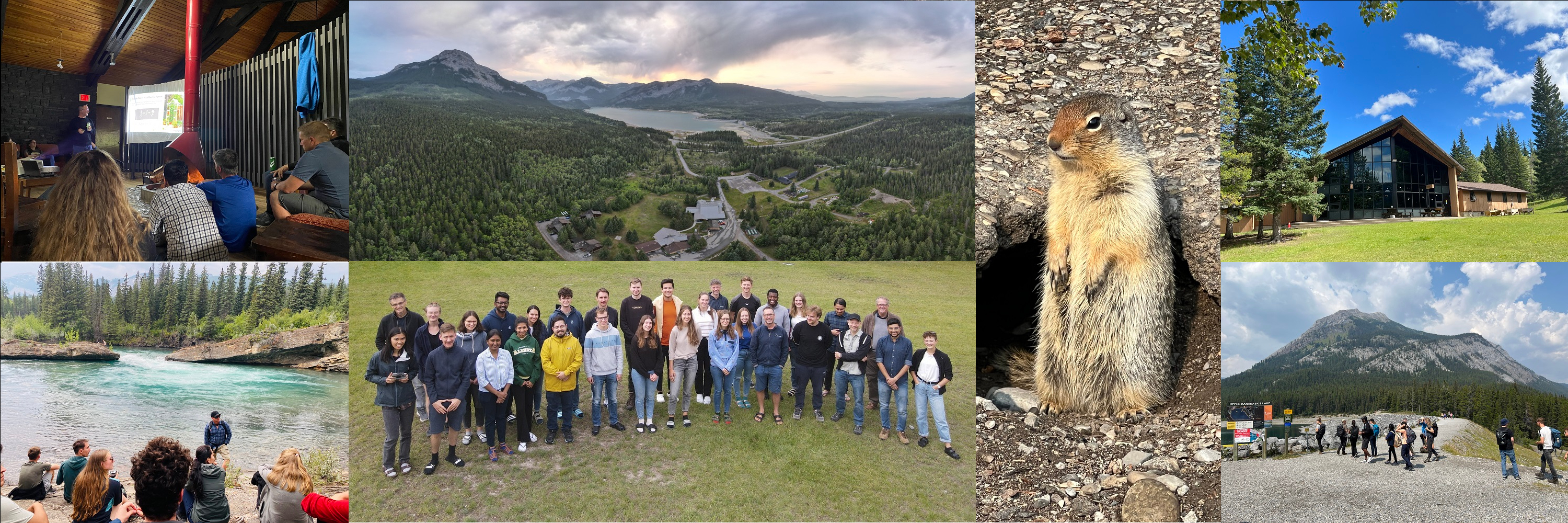
The purpose of the 8th ABBY-Net Summer School is to train young scientists in interdisciplinary approaches to energy and ecosystem research. The program will focus on the interaction between climate change and resource management in the province of Alberta, and the impact of resource extraction on natural ecosystem functioning. Students will attend seminars on key extra-disciplinary topics (energy systems, environmental systems, energy economics, and data analysis), and participate in field excursions designed to educate participants on local resource-management issues. In the later stages, participants will be challenged to develop inter-disciplinary research proposals designed to solve practical problems related to energy development in Alberta and fcilitate future directions in Abby-Net.
for more infos download the Official Flyer.
7th Abby-Net Summer School at the Barier Lake Station (Alberta) 2019:
Trends in Future Energy Transitions

The purpose of the 7th ABBY-Net Summer School was to train young scientists in interdisciplinary approaches to energy and ecosystem research. The course focused on resource-management issues in the province of Alberta, and the impact of resource extraction on natural ecosystem functioning. Students had seminars on key extra-disciplinary topics (energy systems, environmental systems, energy economics, and data analysis), and participated in field excursions designed to educate participants on local resource-management issues. Finally, the participants developed inter-disciplinary research proposals designed to solve practical problems related to energy development in Alberta.
See the article on the Summer School at the Future Energy Systems site of the University of Alberta
6th Abby-Net Summer School in Burg Trausnitz (Bavaria) 2018:
Trends in Future Energy Transitions

The goal of this summer school was to identify trends in energy transitions, their environmental impacts and societal influence. Given such a trend students developed possible scenarios on how the trends will develop in the future.
5th Abby-Net Summer School in Kananaskis (Alberta) 2017:
Future interdisciplinary Research for sustainable Energy Transitions

The goal of this summer school was to bring together students from participating areas of research and enable them to write their own interdisciplinary reaserch proposal in one oft the Abby-Net key topics.
4th Abby-Net Summer School in Ottmaring (Bavaria) 2016:
Future interdisciplinary Research for sustainable Energy Transitions
3th Abby-Net Summer School in Kananaskis (Alberta) 2014:
Future interdisciplinary Research for sustainable Energy Transitions
2nd Abby-Net Summer School in Kloster Banz (Bavaria) 2013:
Future interdisciplinary Research for sustainable Energy Transitions
1st Abby-Net Summer School in Kananaskis (Alberta) 2012:
Future interdisciplinary Research for sustainable Energy Transitions
Abby-Net Online Lecture Series
In this monthly lecture series AbbyNet members present recent results on research related to energy systems and their impacts to environment and society. In addition, talks will provide developlments in data engineering and artificial intelligence related to these topics.
“Combining floods and droughts - Mitigation of the effects of climate change on the local water balance"
by Thomas Baumann
Date: Tuesday, February 28th, 2023
Time: 09:00am to 10:15am MST/17:00 to 18:15 CET
Recent years have recorded an increase of the rainfall intensity which is met by a reduced infiltration capacity causing severe surface runoff,
flooding, and groundwater depletion. Thus, the ecosystem functions of groundwater aquifers are at risk. The project Smart-SWS couples flood
protection and drought management by infiltrating flood waves into porous aquifers close by (Flood-MAR). The water held back in flood
retention basins is conditioned in the infiltration ditch to meet the quality criteria for groundwater recharge. Laboratory experiments to
select suitable materials for the conditioning of the infiltrated waters are run. Here, the focus is on the removal of colloids and particles. As
the infiltration is at irregular time intervals, we expect and test extended drying periods. A GIS-based site selection scheme has been
developed and applied to select pilot sites. It respects (hydro)geological features as well as all kinds of protection zones and
agricultural, municipal, and industrial use cases. To meet the pronounced asymmetry of infiltration (rapid infiltration requires high
hydraulic conductivity) and long term storage (works best with low flow velocities) geotechnical measures like sheet pile walls or
sand/cement injections are required. The concept is based on a minimum invasive approach: groundwater flow should not change at
normal conditions and stagnation of groundwater has to be prevented. A hydrogeochemical model is developed to assess the reactions along
the infiltration path and their effects on the integrity and stability of the aquifer.
This research is carried out together with L. Augustin and A. Dietmaier.
“Water availability, wetlands and resource extraction in Alberta's Boreal Plain"
by Scott Ketcheson
Date: Wednesday, January 25th, 2023
Time: 09:00am to 10:15am MST/17:00 to 18:15 CET
Headwaters, which represent the inception point of streams, are vital regions within any catchment owing to their important role as source-areas of freshwater generation. Wetlands located within these headwaters contribute to increased water availability for receiving ecosystems and larger streams and rivers. In the Canadian Boreal Plain, wetlands occupy over half of the landscape, where resource exploration and development disturbances are abundant. In this talk, I will present field-based hydrological research across a disturbance spectrum from natural to reconstructed landscapes in Alberta’s Boreal Plain. Natural wetlands and their catchments provide a foundation to assess the design and performance of recovering and reclaimed landscapes; however, these catchments are also altered through the prolific resource exploration footprint in northern Alberta. Accordingly, understanding the influence that resource exploration has on water movement in these catchments is key. Results from the Stony Mountain Headwater Catchment Observatory and a constructed catchment in northern Alberta will be presented. I will describe these catchments and some of the innovative technologies that we are using to collect data from the field, as well as present some findings that evaluate water fluxes within the catchments and the influence of seismic lines (linear corridors cleared of vegetation to facilitate resource exploration) on water movement.
“Potential Unintended Consequences of Energy Transitions: Biogas Expansion and Groundwater Quality"
by Bernhard Mayer
Date: Wednesday, May 25th, 2022
Time: 10:00am to 11:00am MST/18:00 to 19:15 CET
Transitions towards more renewable energy sources are pursued to reduced greenhouse gas emissions into the atmosphere associated with the production and consumption of fossil fuels with the goal to minimize the effects of anthropogenic global climate change. While sustainable energy transition strategies are urgently needed to limit the global average temperature increase to less than 2 degrees Celsius above the preindustrial level, caution is required to minimize unintended detrimental consequences for other vital resources, such as groundwater. The objective of this presentation is to assess the likelihood of potential negative impacts on groundwater quality resulting from enhanced production of feedstocks for bioenergy, such as corn. Growth of the area of agricultural land used for the cultivation of biogas feedstocks in concert with enhanced fertilizer applications may cause contamination of groundwater with nitrate. The presentation will compare the current level of groundwater contamination with nitrate in Alberta and Germany and reveal that elevated groundwater nitrate is often fertilizer- and manure-derived. Transit times and fate of fertilizer-derived nitrate will be evaluated to enable an assessment of potential risks for drinking water quality from expansion of feedstock production for bioenergy
“The dynamics of energy transition: connecting modelling to policy design"
by Sara Hastings-Simon
Date: Wednesday, April 27th, 2022
Time: 10:00am to 11:00am MST/18:00 to 19:15 CET
Interconnected energy systems such as electricity, transportation, buildings, and industry can be expected to exhibit complex dynamics in the transition to low carbon. The emerging area of “macro energy systems” research, which combines quantitative analyses with a more holistic treatment of the systems in question can help create a better understanding of the mechanisms that drive change, the capacity of the system to absorb change, and the response of the system to policy interventions to manage impacts. As governments act on macro energy systems, this understanding can enable the required emissions reductions while significantly improving economic outcomes through the transition. The talk will focus on three areas of research which are connected through the thread of building an understanding of the dynamics of energy transitions, on the basis of which policy can be designed to improve their outcomes. This includes modelling the contraction of an existing energy system, the constraints and opportunities existing infrastructure place on transition, as well as the observed influence of incumbent industries in shaping climate and innovation policy.
“A Canada - Germany "Clean" Energy Collaboration: Potential versus Reality"
by Rüdiger Tscherning
Date: Wednesday, March 23rd, 2022
Time: 10:00am to 11:00am MST/18:00 to 19:15 CET
The European Climate Law sets out the European Union's commitment to climate neutrality by 2050. To detail how the EU will deliver on this ambitious goal, the European Commission published a "Fit for 55" climate neutrality package in July 2021. In light of the Fit for 55 agenda and its focus on transforming European industry, and the transportation and energy sectors, this lecture examines the role that Canada could play in accelerating the decarbonisation of Germany's economy as well as securing strategically important energy security in Europe through closer trans-Atlantic alignment. The talk will focus on three areas of potential cooperation. It commences with a discussion of Canada-EU climate policy. It then examines Canada's role in producing and exporting clean hydrogen to the EU, and concludes with a discussion of Canada's potential to act as a supplier of critical raw materials to enable the Fit for 55 transition (e.g., scaling-up of renewable energy, electric vehicle batteries). The lecture will draw upon the last six years of comparative energy and climate law and policy research in Canada's energy-jurisdiction to ponder if we are closer to, or further from, a reliable trans-Atlantic clean energy collaboration.
“Surveilled Planet: AI-Driven Earth Observation"
by Matthias Schubert
Date: Wednesday, February 23rd, 2022
Time: 10:00am to 11:00am MST/18:00 to 19:15 CET
Over the last couple of years, the number of earth observation data drastically increased as new satellite missions emerged and sensor equipped aerial vehicles became more and more common. Although there exist multiple products which can be derived by physical models from raw sensor data, the use of modern AI technology can open up new applications, improve data quality and significantly reduce the effort to analyse raw sensor data. In this talk, we will discuss the use of remote sensing technology for research in sustainable energy transitions. After highlighting the general properties of Deep Learning, we will focus on typical problems of this machine learning paradigm in remote sensing applications. Finally, we will highlight several novel AI methods that can help to overcome these challenges. In particular, the talk highlights methods in the areas of spatial interpolation, super- resolution networks and label generation in weakly supervised settings.
“Electrode Architectures for Bioelectrochemical Energy Systems"
by Katharina Herkendell
Date: Wednesday, January 26, 2022
Time: 10:00am to 11:00am MST/18:00 to 19:15 CET
Bioelectrochemical cells gain increasing attention for high-purity and low-emission conversion of renewable electricity to and from liquid or gaseous energy carriers. This talk will provide an introduction to the employment of enzymes and microorganisms as renewable catalysts in distributed energy systems, which are particularly promising for the chemical storage of renewable surplus energy (Power-to-X), and the electricity generation from low-temperature waste streams. With increasing applicability, these concepts need to be reviewed regarding efficiency, scalability, stability, and sustainability. In this talk, our latest approaches of integrated biocatalytic electrode architectures will be reviewed, and current constraints and future perspectives will be outlined.
“Life Cycle Carbon Footprints of Hydrogen Technologies"
by Jule Bergerson
Date: Wednesday, November 10, 2021
Time: 10:00am to 11:00am MST/18:00 to 19:15 CET
The role that hydrogen can and should play in our energy future is a hot and controversial topic. This talk will review the life cycle GHG emissions implications of different hydrogen options. In addition, the review includes the technologies that they must compete against to contribute a climate solution and therefore potentially play a larger role in our energy system. These include both incumbent technologies as well as potential future technologies. A review of current literature, confirms that certain hydrogen supply chains can reduce GHG emissions but certain conditions must be realized. This talk will emphasize the need for a systems-level and comprehensive assessment approach when considering these options.
“What the frack…” Risk Perceptions and Partisanship around Hydraulic Fracturing in Western Canada
by Sven Anders
Date: Wednesday, September 22, 2021
Time: 10:00am to 11:00am MST/18:00 to 19:15 CET
Open to all ABBY-Net Members. Interested parties very welcome. Please register with (Julia Linke).
Hydraulic fracturing (HF), colloquially known as fracking, has become a divisive topic for its potential to trigger seismic activity, or earthquakes, and other related environmental problems. While HF has been practiced in Western Canada since the 1950s, research investigating factors affecting public perception of the technology and its associated risks, including induced seismicity are not well understood. This study investigates public perceptions of HF and quantifies to what extent perceptions of environmental impacts, induced seismicity risks industry knowledge, and economic benefits and returns of HF contribute to individuals acceptance of HF in their region. Building on a large scale experimental survey the results reveal that public acceptance of HF is controversial. Strong ties between rural residents and the O&G industry is a cornerstone of economic activity that translates into support for HF. This contrasts with the critical views of a mostly urban, anti fossil fuel inclined public that emphasizes the seismic risks of HF and its possible impacts on ground water resources. As a consequence, acceptance ratings of hypothetical HF project scenarios show distinct bimodal distributions that reflect opposing respondent camps their political orientations and overall trust in the Western Canadian oil and gas industry.
(Hi)Stories of Energy Transitions
by Petra Dolata
Date: Wednesday, June 23, 2021
Time: 10am to 11am MST/18:00 to 19:00 CET
As current discussions revolve around decarbonizing the economy, net zero emissions targets and the upcoming global energy transition, understanding society’s role in such transformative processes will be paramount. Recognizing that energy transitions also include social and cultural transformations and conceptualizing energy systems and regimes as socially constructed and narrated, histori ans examine specific energy transitions in the past as well as the many stories that have been created to make sense of and frame these transformative processes. They investigate how individuals, communities and nations have caused, adapted to and rejected changes in energy systems providing a better understanding of historical resilience and agency while facilitating empathy, especially since energy transitions are oft en connected to processes of deindustrialization and entail winners and losers. In this presentation, I will present some histories and stories of energy transitions and discuss how societies and cultures have responded differently to and created different stories about the same energy challenges. This diversity of historical experiences and narratives highlights how important it is that we know more about our energy pasts. Such historical knowledge facilitates informed discussions about our energy futures that include and give voice to every citizen and have the potential to facilitate the creation of just and sustainable policies.
The Uncertainties of Modelling Hydrology under a Changing Climate
by Tricia Stadnyk
Date: Wednesday, May 26, 2021
Time: 10am to 11:00am MST/18:00 to 19:00 CET
slides of the talk
Canada is experiencing some of the most accelerated climate driven change in the world, which has direct impacts to our water supply and water security, and in turn energy security. With more extreme and intense floods and drought, sustainable management and distribution of water depends on accurate a priori knowledge of changes in the water cycle as well as human control over regional water distribution. For this, models are required to accurately predict and project changes in runoff and water balance, and the associated environmental impacts of local scale change on continental supply. Dealing with the uncertainties in these projections, however, is a difficult task particularly for water resources operations. In this talk, I will discuss recent approaches used to detect changes in long term , Canadian water supplies with improved reliability, including flood and drought extremes and their impact on prediction of energy supply for the hydropower industry. Diagnosing and dealing with uncertainty is critical for improving the reliability of hydrologic prediction. With more than 60% of Canada’s water draining North, understanding the cumulative downstream changes and impact s of change is crucial for ecosystems, water security, and the Canadian economy.
Interpretable PID Parameter Tuning for Control Engineering using General Dynamic Neural Networks
by Klaus Diepold
Date: Wednesday, April 28, 2021
Time: 10am to 11:15am MST/18:00 to 19:15 CET
Automation in complex (energy) systems rely on closed loop control, wherein a controller interacts with a controlled process via actions, based on observations. These systems are increasingly complex, yet most deployed controllers are linear Proportional Integral Derivative (PID) controllers. PID controllers perform well on linear and near linear systems but their simplicity is at odds with the robustness required to reliably control complex processes. Machine learning techniques are a way to extend controllers beyond their linear control capabilities by using neural networks. However, such an extension comes at the cost of losing stability guarantees and controller interpretability. I review the utility of extending PID controllers with recurrent neural networks and show that this approach performs well on a range of complex control systems a nd highlight how they can be a scalable and interpretable option for modern control systems. I also address the lack of interpretability that prevents neural networks from being used in real world control processes. I discuss bounded input bounded output stability analysis to evaluate the parameters suggested by the neural network, making them interpretable for engineers. This combination of rigorous evaluation paired with better interpretability is an important step towards the acceptance of neural network based control approaches for real world systems. It is furthermore an important step towards interpretable and safely applied artificial intelligence.
Talks on AI and Energy
Reinforcement Learning-based Control of Building Subsystems
by Omid Ardakanian
Date: Wednesday, March 24, 2021
Time: 10:00 am to 10:30 am MST/ 17:00 to 17:30 CET
slides of the talk
Commercial buildings consist of multiple mechanical and electrical systems that work in tandem to provide a healthy, safe, and comfortable environment for occupants. These systems have complex interactions with each other and consume a large amount of energy. In this talk, we apply three model free deep reinforcement learning algorithms to jointly control HVAC and blind systems in a multi zone test building, in scenarios with and without automatic dimming of the lights in response to daylight levels. The control agents are trained through interactions with a building simulator that generates traces for the movement of occupants. We investigate the three way trade off between energy use, thermal comfort, and visual comfort, and discuss how the joint control of the building systems could provide a better trade off compared to when they are controlled separately. We compare the perform ance of the proposed control algorithms assuming the availability of occupancy data with two spatial resolutions and confirm through experiments that a better trade off can be achieved should zone level occupancy information become available. Incorporating zone level occupancy information, we show that 11.0% and 31.8% more energy can be saved respectively in heating and cooling seasons over existing rule based baselines that control the same building systems.
Smarter, better, cheaper? The potential of AI in energy systems in two exemplary applications
by Thomas Plankenbühler and Sebastian Kolb
Date: Wednesday, March 24, 2021
Time: 10:30 am to 11:00 am MST/ 17:30 to 18:00 CET
slides of the talk
In the interplay of liberalised energy markets, the need for more energy efficiency and the goal of carbon neutrality, there is a clear need to make energy production more intelligent, aiming at an increase in efficiency and economic profit. The use of mod ern computational approaches often framed as “AI” is one option to work towards those goals. This talk presents and discusses potential usages and benefits of AI in energy systems on the basis of two applications. The first case addresses the challenges of intermittent renewable energy production and volatile commodity prices on the operation of Power to Gas rectors. In order to run the units in an economically optimised and technically feasible way, we establish a model predictive control taking into consi deration market conditions and physical properties of the reactors. In this context, Artificial Neural Networks are introduced to (accurately yet computationally inexpensively) predict prices for electricity, gas and CO2 certificates on a day ahead basis. In the second example we present a work flow for an improved process control of biomass power plants. Introducing predictive thermal load management and a just in time computer vision approach for fuel analysis in the power plant environment, our measures stabilize the furnace while increasing efficiencies and reducing hazardous emissions. Together, these two approaches illustrate the potential of AI assisted control strategies in future energy systems.
Power on Short Notice: Roles and Applications of Mechanical Energy Storage Systems
by Pierre Mertiny
Date: Wednesday, Februar 24, 2021
Time: 10am to 11am MST/18:00 to 19:00 CET
slides of the talk
The intermittent behavior of wind and solar power generation,and the entrance of electric mobility into the marketplace will require the addition of significant energy storage capacity to the current power infrastructure. Fluctuations in power generation and demand present challenges in load balancing, electric grid reliability, and power quality. Energ y storage (ES) is anticipated to provide the solution to these issues but is far underutilized and lacking in diversity. In the United States, only 2.5% of the delivered electrical energy uses ES as a critical component in maintaining a reliable supply of energy. Flywheel energy storage is a form of mechanical ES that has been implemented into power systems to reduce power spikes, provide frequency regulation, improve power quality, and serve as uninterrupted power supply, due to advantageous characteristic s of this technology. The latter includes high charge and discharge rates, lifetimes ranging up to 20 years, and high specific energy. Further, flywheel energy storage systems do not experience depth of discharge effects and have a relatively high cycle efficiency up to 95% depending on the electrical components. While flywheel energy storage has a wide variety of application across many industries, the technology is still developing. The presentation explores this technology and its opportunities in the co ntext of a changing power infrastructure.
Climate Change and Energy Systems – a Sensitive Interface
by Ralf Ludwig
Date: Wednesday, January 27, 2021
Time: 10am to 11am MST/18:00 to 19:00 CET
slides of the talk
Climate change is expected to have severe impacts on energy demand patterns and supply systems. In addition to gradual transitions (such as rising temperature and decreasing precipitation) it is projected that hydrometeorological extreme events are increasing both in terms of intensity and frequency. The susceptibility to climate variability and climate change in general, and extreme events in particular, depends strongly on the energy systems in place, with renewables, due to their direct dependency on climate variables, likely to be much stronger affected. Due to the high regional variability of extreme events and the overall large uncertainties in estimating future extremes under climate change, vulnerability assessment of regional energy sectors to climate extremes remains a highly complex research task. The presentation will introduce to the mutual dependencies of energy systems and climate change as a sensitive interface and will show some examples of expected impacts on various spatiotemporal scales.
Abby-Net Research Workshops
14th Abby-Net Research Workshop at the University of Calgary at August 1st, 2025

13th Abby-Net Research Workshop at the University of Calgary at August 9, 2024

12th Abby-Net Research Workshop at the University of Calgary at August the 5th, 2023
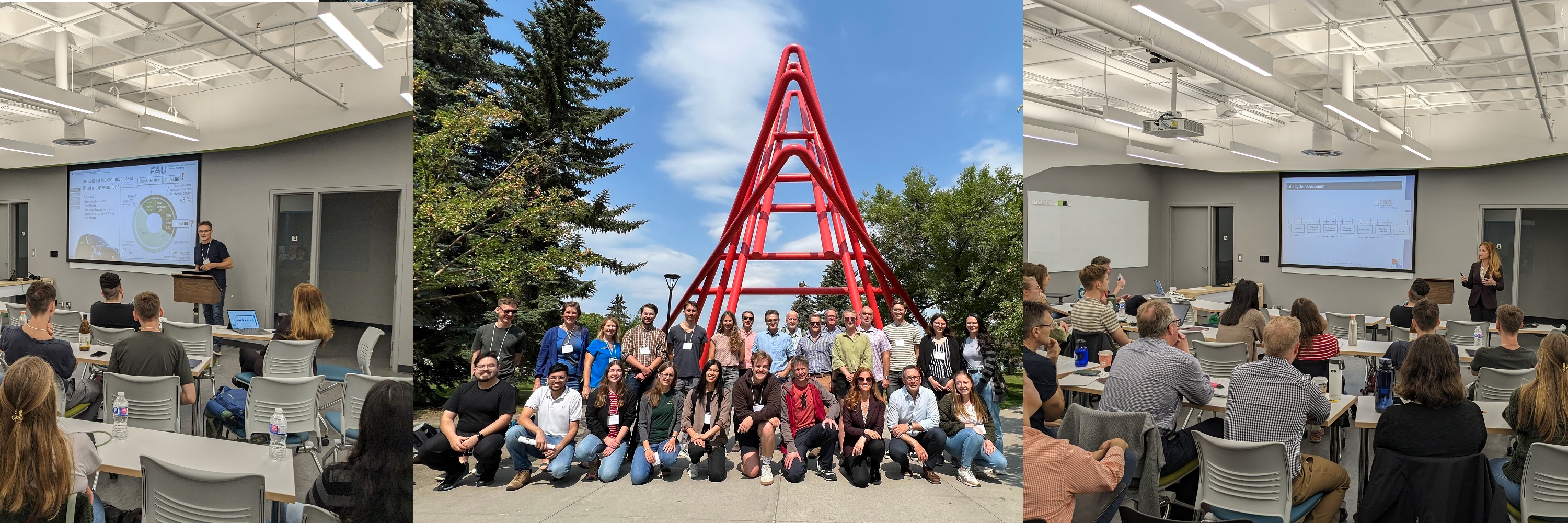
This one-day workshop preceding the 8th Abby-Net Summer School gave the PIs the opportunity to provide updates on the running projects and new project ideas. Furthermore, students doing research thesis within Abby-Net had the opportunity to present their research. Of course, the workshop also allowed for an open discussion on future developments and technological innovations in sustainable technologies.
11th Abby-Net Research Workshop at LMU Munich in November 2022
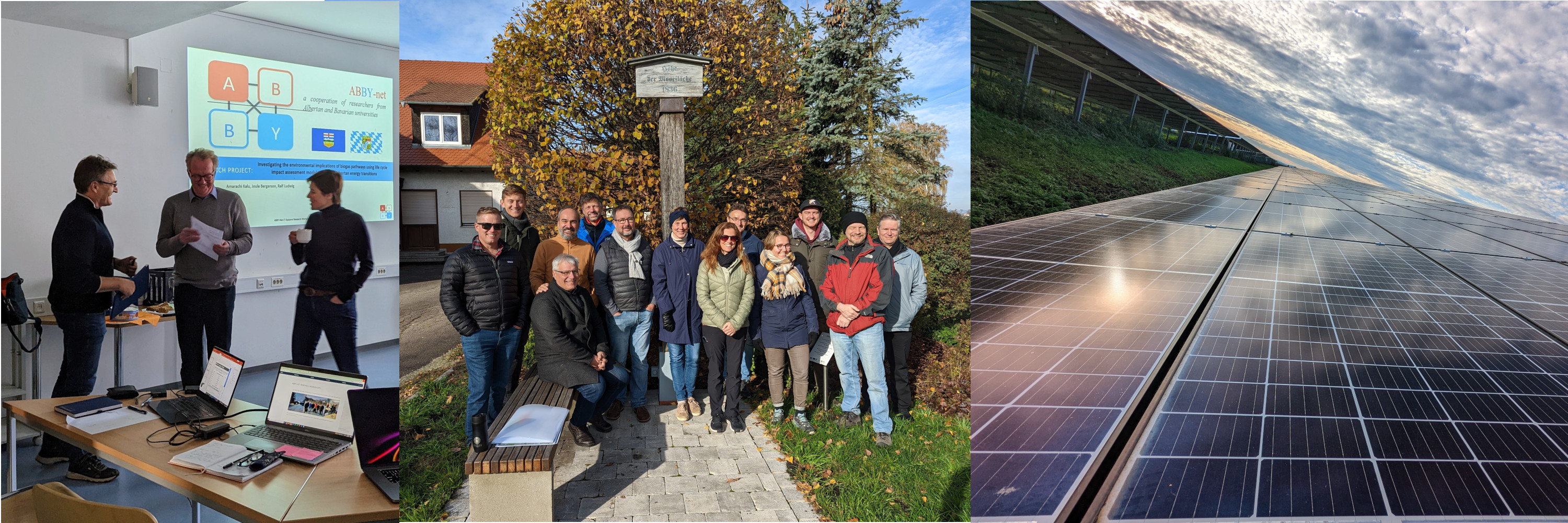
The first post-pandemic Abby-Net workshop took place in Munich at the geoscience department at LMU Munich. At this four day meeting Abby-Net members presented research results related to energy systems and their impact on the environment. Besides analyzing the dire environmental situation the planet is in, researchers presented novel methods and projects on sustainable energy systems.
10th Abby-Net Research Workshop at the Kananaskis Field Station (Alberta) in January 2020
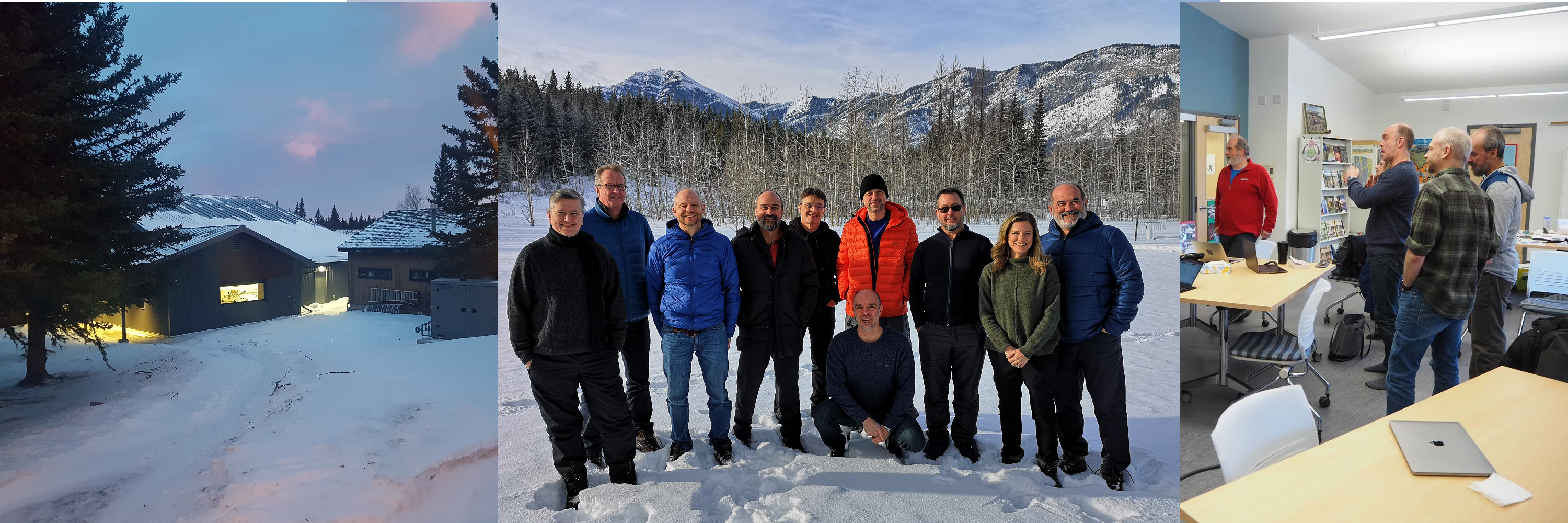
At this meeting Abby-Net members discussed ongoing projects and started working on a joint proposal allowing PhD level students to work on E3 research questions.
9th Abby-Net Research Workshop at the University of Calgary (Alberta) in August 2019
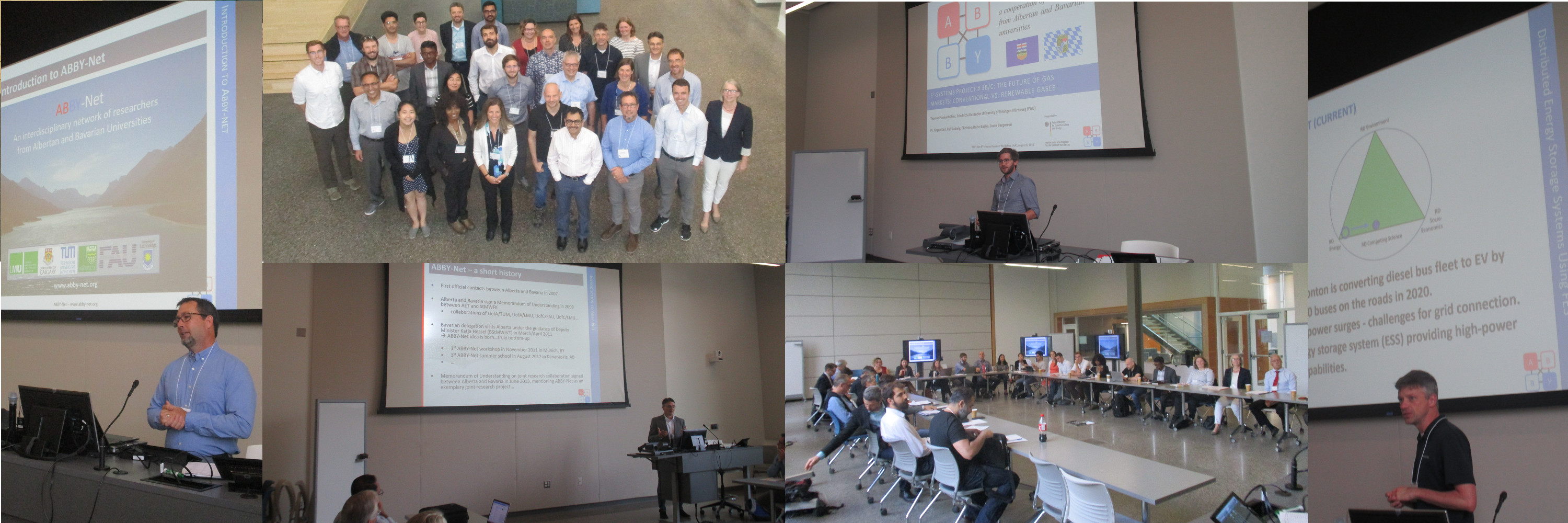
At this workshops Abby-Net researchers and their students presented the results of Abby-Net E3-Projects and related research.
Details on the Workshop
Workshop Program
8th Abby-Net Research Workshop at Technical University Munich in August 2018
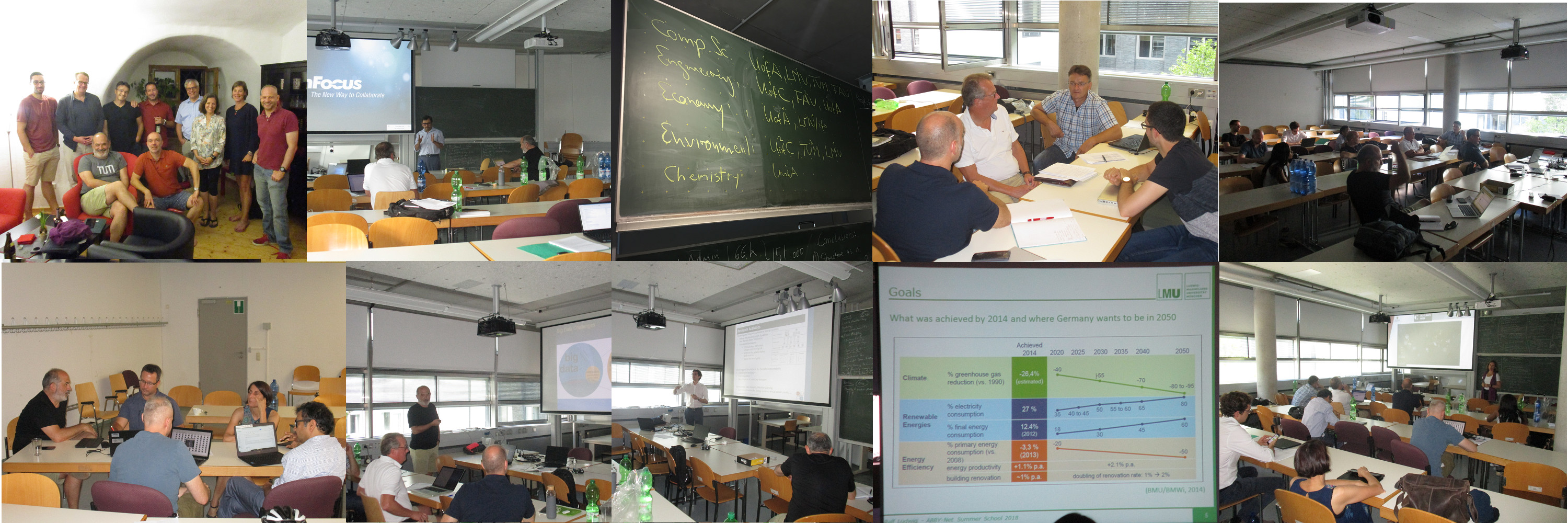
At this Workshop, AbbyNet members presented the current status of the original E3-Projekts and defined new projects.
7th Abby-Net Research Workshop at the University of Calgary (Alberta) in August 2017
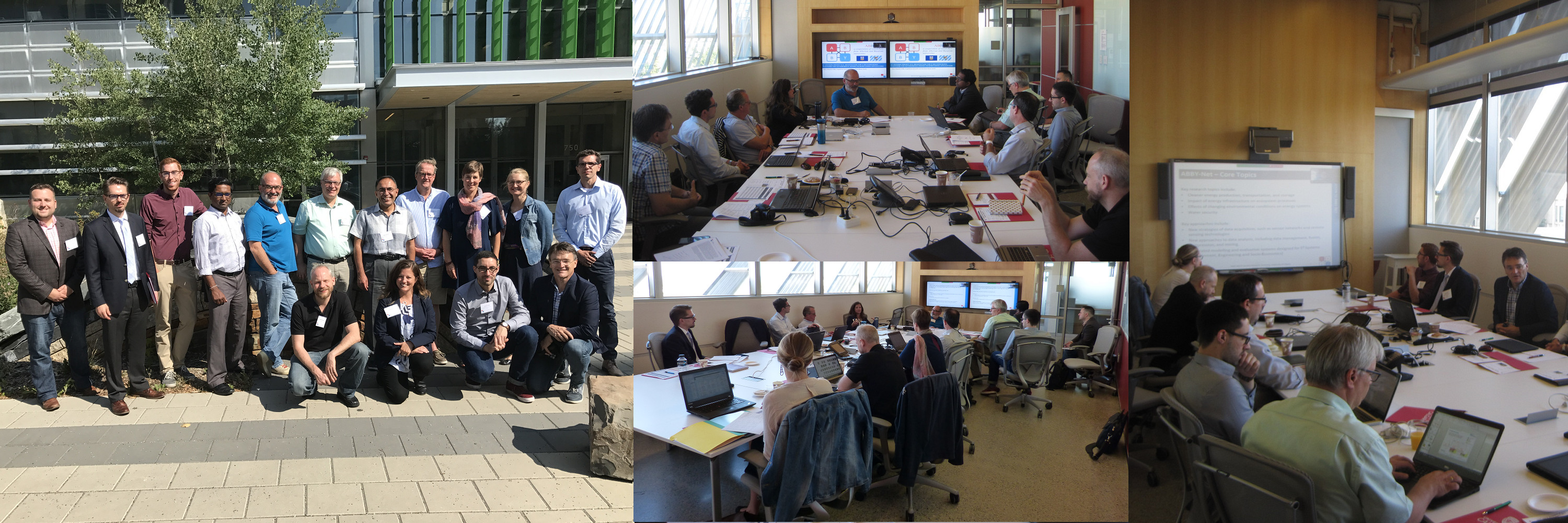
Before the Summer School 2018 in Kananaskis, the second workshop in 2017 took place at the University of Calgary. At this workshop AbbyNet researchers presented first progress in on the first batch of E3 research projects and discussed how to proceed.
6th Abby-Net Research Workshop at Reykjavík University in February 2017
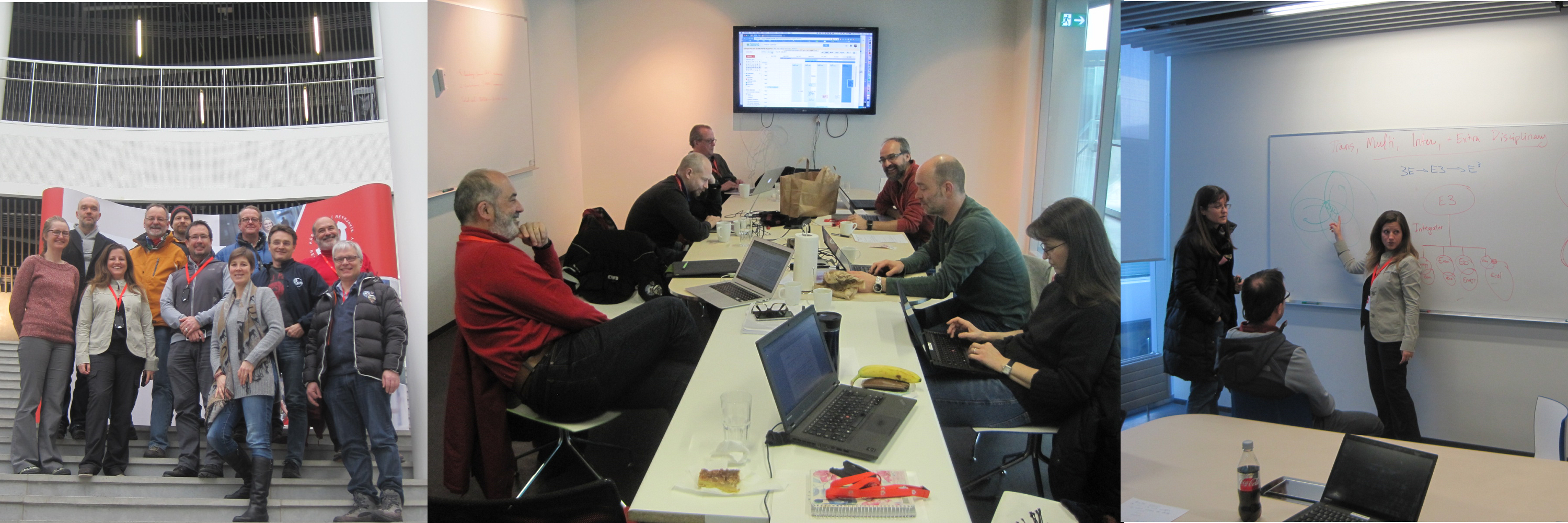
At thie workshop the idea of the E3-Systems Projects was born. Each E3-Project works on a well-defined research question in the context of energy transitions. The E3-Systems projects are usually pursued by master or bachelor students which are co-supervized by an international and interdisciplinary research team.